I hosted a wide-ranging conversation with the National Farmers’ Union (NFU) president, Minette Batters, at the Hay Literary Festival earlier this year.
Gove re-occurring , ‘cheap’ food arguments, farming bogs, issues with subsidies, admirable poultry, over-hyped soil and culture changes – so much, so little space, so little time…Minette was delayed but had enough breathe to open with ‘the big success for women will be when it’s not newsworthy [to be the first female leader in 110 years of NFU’s history]. We got a Brexit question out the way early. ‘As electoral rules say you have to take a position to engage, the NFU council took the remain position’.
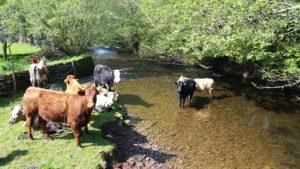
We moved onto how she viewed the government’s Health and Harmony (H&H) paper with the NFU doing a 100 page response and a recorded message to every member because Micheal Gove ”operates very much a numbers game and wanted 100k responses” (there were circa 44k). In response to my question on the “health” aspect of the heading, ‘Was the government seeking a subtle change of direction – adapt diet, pay more, waste less food, reduce strain on the NHS?’, Minette lauded the social and environmental vision of H&H but lamenting it did ‘not really mention food at all and we are farmers and that is what we do’. Naturally the media picked up on her comment re an Essex beauty salon. (The Times and Guardian).
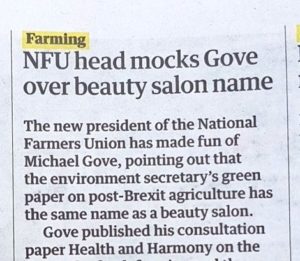
I persisted, to no avail, on musing if we as society changed how we eat, it could impact on whole food chain, pay farmers more for higher quality food…but let her off the hook by rolling it into a question on subsidies to which Minette robustly told me ‘public monies for public goods is fine…..but the market is savage beast and after the long term cheap food policy, there are some big things which need to be sorted’. I demurred on food being ‘cheap’ but, with only an hour, we galloped on to questions from the floor, with Minette acknowledging poverty and struggling over that most wicked of problems – how ‘to be able to produce food for all [consumer] incomes, with the farmer receiving over cost of production’ i.e. profit.
Tough questions prevailed with an accusation of NFU being in the pocket of global industrial giants [questioner to appear at Abergavenny Food Festival 16 Sept at 13.00], which Minette refuted, saying that govt had driven the low prices policy and hinted there were some unbearable inefficiencies out there and without ‘profitable farming underpinning H&H, green Brexit will go nowhere’.

Calmer waters didn’t last long, as I queried if new air pollution regulations (including organic farmers having to cover manure heaps – cue sniggers from the audience), might drive up short-term costs for farmers but reduce long-term costs to the environment. She was confident at farmers’ ability to detect new funding streams, innovate more, reduce impact [on the environment] and be at the forefront of delivery on climate change. Picking up on adaption, I referenced past NFU presidents wanting, not too loudly, to get away from subsidies as they stifled innovation, to which she reflected the CAP was forged when Europe was starving – not applicable today, bar the foodbanks – and that comparisons with New Zealand’s withdrawal of subsidies was ‘false’ due to their booming export market and terrible side effect of suicidal farmers. When subsidies are ‘fundamentally there for market failure to protect consumers and farmers’, a member of the audience gave a spirited defence of them, with which Minette concurring that ‘no farmer wants to be supported if they could make a profitable living out of what they produce.’
Which drew me onto a ‘public good’ payments for stuff the market doesn’t currently pay for such as landscape, wildlife, water catchment – ‘is the NFU ready to help farmers produce other ‘goods’ that society wants?’
This drew a robust response that support should go to where the business risk is being taken by ‘active’ farmers, and a farmer paid to farm a bog might get short thrift if NHS funding came a-calling. OK, how easy would it be for farmers to embrace more mixed farming, as Gove mentioned in my interview with him, made Minette retort, nay almost snort, “when Micheal Gove talks about it, he makes it all sound simple but it is hugely complex” with qualified stock-persons and high levels of investment, which are all tough decisions to make now until farmers see who their trading partners are.
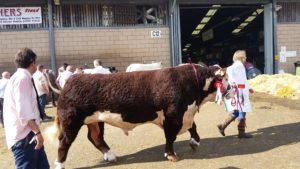
A probing question from the audience on food security (the state of having reliable access to a sufficient quantity of affordable, nutritious food) – too often confused with self-sufficiency (albeit concerns at this dropping from 80 to 60%)- was well phrased as ‘how can we farm productively and environmentally and feed everyone and do it economically?’, provided according to Minette a ‘really difficult, ethical challenge especially with a Royal Society report querying the offshoring emissions and other environmental impacts, when Gove, often referred to as the Sec of State for the Environment, had seemingly down graded the importance of food.’
Continuing with politicians, I referred to George Eustice (Defra Minster) saying ‘Green schemes [agri-enviro] will be a no-brainer for farmers‘ and how easy would it be for farmers to make a profit under WTO rules (in line with proposed payment for public goods), when current support was purely for costs-forgone in undertaking agri-enviro works? The audience were no doubt bemused by a short technical but vital discussion on amber box payments being negotiated through ‘Aggregate Measure of Support’. A matter for Gove up next day at Hay – not! (A taster of Rosie Boycott v the Sec of State – Hay take here and my twitter take here.)
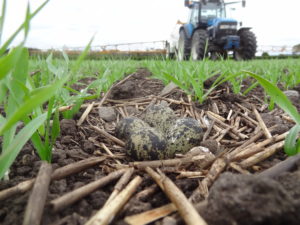
Meanwhile, we touched on how the media portray farming such as pesticides (all bad) – and is it time we reconciled that the Green Revolution came at a cost (Rachel Carson’s Silent Spring), better ways to wield necessary use of agro-chems and issues around animal welfare.
Minette said that farmers were working towards a more targeted approach – pesticide and fertiliser use has halved (others worry about toxicity) with precision practices working towards smarter farming without Mr Gove having to mention fields being drenched with pesticides (Guardian v Farmers Weekly). Talking of smarter, she spoke highly of the poultry sector for having reduced its antibiotic use while also supplying consumers with chicken ranging between £2.50 and £18.00 a bird. ‘They were producing a product for the market place and it is totally consumer led’. (See previous at Hay). Minette also hinted there were big debates on how consumers drove welfare issues and ‘there are big challenges on keeping animals inside and outside which need to be underpinned by science, not ideology and emotion’.
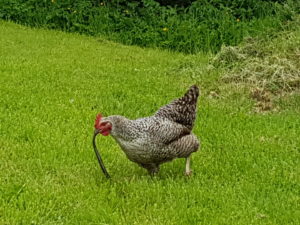
An unsentimental audience chuckled at the inconvenient incident of my high welfare free-range chickens compromising the conservation of lower foodchain wildlife.
There was barely time to explore confused semantics over production versus productivity – let alone differences between grants, subsidies, support payments.
The crowd probably frowned when I mooted if soil was over-hyped in the context of us gearing more investment towards exploration of hydroponics, vertical and underground salad farms closer to urban areas . Yes, it’s still very expensive, but when LED costs come down, it will ‘fly’ she told me. More down to earth, I raised a question both about mental health around lonely farming, as well as the NFU helping some farmers depart the industry in face of massive changes ahead. Minette told me her vice president, Stuart Roberts, was focused on this – as too often farmers discussed livestock welfare and crop health but not their own well being. A question from a young NFU Cymru farmer prompted her to concur the union had a role in driving a culture change in helping young people enter the industry, because it’s not ‘just about land ownership’, while also helping farmers to ‘retire well’.
With a positive note about Sue Hayman, Shadow Secretary of State for Environment, Food and Rural Affairs, ‘she is a breath of fresh air who aims to launch a Food Manifesto soon’, the platform light was flashing red and Minette rounded off with ‘not hiding behind France or riding on Germany’s coat tails, but us having to knuckle down and do it ourselves to build a bigger, better Britain’.
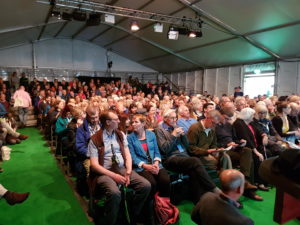
Here’s Hay Festival’s somewhat shorter take on the event and in the meantime, I would suggest, part of knuckling down is having more frank conversations in non-traditional places outside the rural sector to wider audiences. Do add your comment below.
Whole transcript – not verbatim (Word doc). Header pic credit Ruby Ingleheart
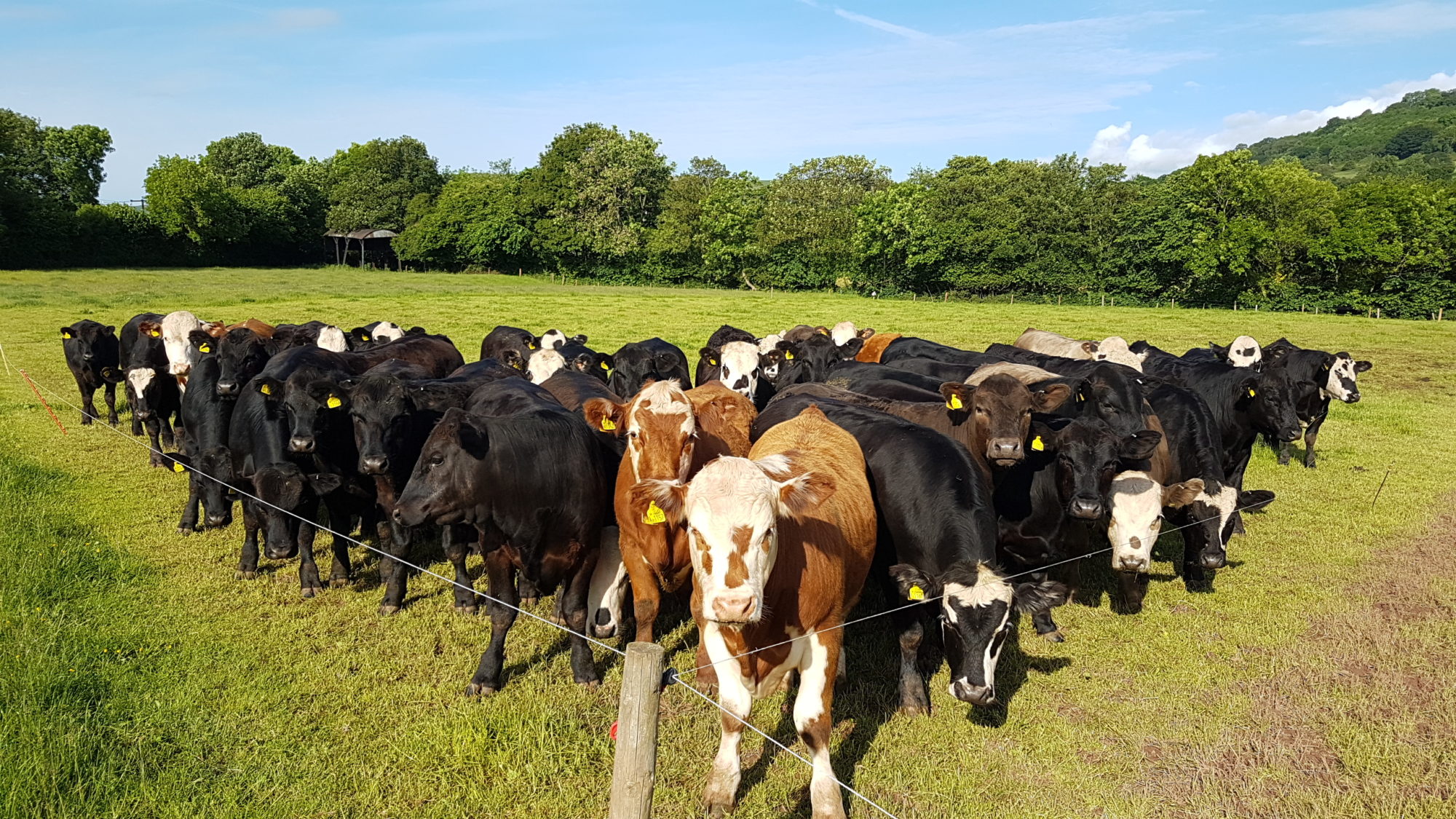
Wind ranging indeed Rob. Bravo on another successful Hay event, with a clearly engaged audience (although how diverse??) and a full and thorough trot through a wide range of #farmenviro issues.
”We are farmers; that is what we do” – the clue is in the name with the National Farmers Union. First and foremost they exist to amplify the voice of food producers aka farmers. As we both know, the narrative of the countryside needs to be about more than food production but critically production itself must not be sidelined. It is integral. It is part and parcel of the whole. Similarly we know that more needs to be done to improve the state of nature (State of Nature reports etc). We both know that there are a lot of farmers out there doing good work for the natural world both inside and outside of the formal stewardship schemes. However, without a truly landscape approach that brings individual farms together it is going to be difficult to make significant progress. At the moment, if you get involved in a countryside stewardship scheme (or equivalent in parts of the UK outside England) you are signing up to many hours tied up with paperwork and box ticking. Yes, there are benefits to it but there remains a lot to be improved. Public payments for public goods MUST remove as much bureaucracy as possible (which I see as impossible with the current civil service mindset) for the farmer/land manager if it is to be successful.
When it comes to the media portraying farmers/farming – have you come across Anna Jones’ new project #JustFarmers ? – https://twitter.com/hashtag/JustFarmers?src=hash&lang=en
Thank you Ben. Tough call on reducing bureaucracy and ensuring public funds accountable with results producing best ‘bang for your buck’ – as Sir John Lawton once referred to conservation payments!
Yes, have come across Anna Jones laudable ‘campaign’ #justfarmers helping farmers in communicating what they currently do, and in my eyes, more importantly talking about other ‘outputs’ they, as land managers, can provide society with in the future. Pollinator habitat, water catchment management, and landscape-scale ‘bird food’ being just three examples of ‘public goods’.
You’re right Ben, simplifying the system is fundamental to better environmental delivery. Caring for the environment and conserving beautiful places also needs to be more dynamic and exciting to keep the younger generation interested. The prescriptive preservation approach will empty the uplands of people. Farmers need to be tasked with finding the solution and given the sense of ownership of the challenge. Rules are a headache we could all do without – so it is a matter of finding that sweet point with regulation which drives progress rather than stifles it (and makes us all rule breakers).